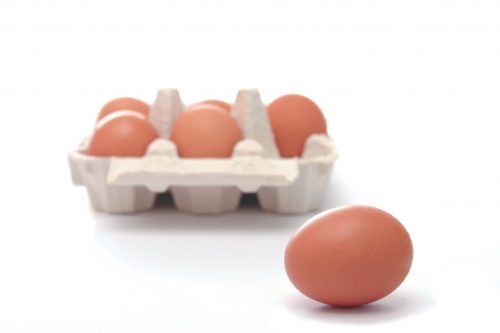
There's a lot to be said in favour of including the humble egg in your diet on a regular basis.
We've been eating eggs since prehistoric times when, no doubt, raiding a nest required a little more effort than opening the fridge door. The last nutrition survey found that (excluding eggs used in baking), about a quarter of adult Kiwis consumed four or more eggs each week, nearly half of us had 2-3 eggs a week, and 1/3 of us had less than that. While eggs are a central ingredient in many cuisines, they've received a bit of bad press over the years, mainly focusing on the high cholesterol content of the yolk. But there's a lot of positives to regularly including eggs in your diet.
Egg nutrition
A medium egg provides around 315 kilojoules of energy, 6g of protein, nearly 6g of fat (1.7g saturated) and virtually no carbohydrate. The egg white is entirely protein whereas the yolk contains all of the fat and a little less than half of the protein. Eggs contain a range of vitamins and minerals, with a higher proportion of almost all of them found in the yolk. Egg yolk is also one of the few foods containing vitamin D, so could be an important source of the vitamin for people with limited sun exposure. (We produce vitamin D in our skin but some sun exposure is required.)
Protein is made up of differing amounts of the 20 amino acids and the quality of dietary protein is judged by the balance of those amino acids, especially the ones our bodies can only get from food, compared to our requirements. Egg protein is considered to be high quality.
Two eggs provide around 1/3 of our daily requirement for iodine and about 1/4 of our daily requirement for selenium. These are both minerals that our soils are low in and some of us don't get enough of.
Egg yolks are a good source of two carotenoids, lutein (loo-teen) and zeaxanthin (zee-a-zan-thin). These antioxidants have been found to be especially important for eye health and studies have shown that regular consumption of eggs will increase the levels of these antioxidants in the macular of the eye where they're needed.
What about cholesterol?
Cholesterol is a waxy substance found in all animal and human tissues. It plays a key role in the digestion, absorption and transport of fats throughout the body and is used in the production of vitamin D and various hormones. All cells, especially the liver, are continuously making cholesterol and this accounts for most of the cholesterol in our bodies.
Cholesterol from our diet is found in animal products and eggs are one of the foods particularly high in cholesterol. In years gone by, eggs became demonised because of this high cholesterol content but science has moved on since then. In healthy people, eating a high-cholesterol meal does not raise blood cholesterol, as the body will either make less or eliminate more in order to compensate. But for anyone with high cholesterol the advice is to limit yourself to three eggs a week (as well as limiting saturated and trans fats, so don't fry your eggs in butter!).
Eggs have special properties in cooking
As well as being a super-easy meal starter when boiled, poached, scrambled or 'omeletted', eggs have three unusual characteristics as a food ingredient.
-
Egg whites (albumin) form a stable foam when whipped (the proteins and fat in egg yolk would interfere with this).
- Egg yolk contains a fat called lecithin which acts as an emulsifier, that is it can stabilise fat and water mixtures. This property is used in mayonnaise, sauces and cake batters.
-
Heating eggs causes the proteins to transform from a liquid to a jelly.
Are raw eggs safe to eat?
The risk of food poisoning from eggs is highest with raw and lightly cooked dishes, so it's advised that foods made with eggs, like omelettes and baked egg custards, are thoroughly cooked. People at most risk of food-borne illnesses – that is young children, older people, pregnant women or anyone currently unwell or with a damaged immune system – should not eat foods containing raw egg, like egg-nog or homemade mayonnaise.
Storing eggs
Store eggs in the fridge otherwise they can deteriorate quite quickly. To protect the quality of the egg, store with the broad end up and the pointed end down as the air cell (which enlarges as the egg ages) is at the broad end. As the egg shell is porous, eggs should be kept away from strong-smelling foods which can taint them.
Eggs perform best when used at room temperature so, if you can, take them out of the fridge half an hour before using. This will help stop the shell cracking when boiling, give greater volume to beaten eggs or whites and stop the membrane breaking when cooking.
Did you know?
- Eggs are sized by weight not circumference, so your size 6s may not all look the same size.
- Hens with white feathers and ear lobes lay white eggs, whereas hens with red feathers and ear lobes lay brown eggs.
- Egg white is in fact clear when raw – it only turns white when beaten or cooked.
- Double-yolked eggs are more commonly laid by young hens but occasionally a hen will lay double-yolkers throughout her laying career.
www.healthyfood.com











